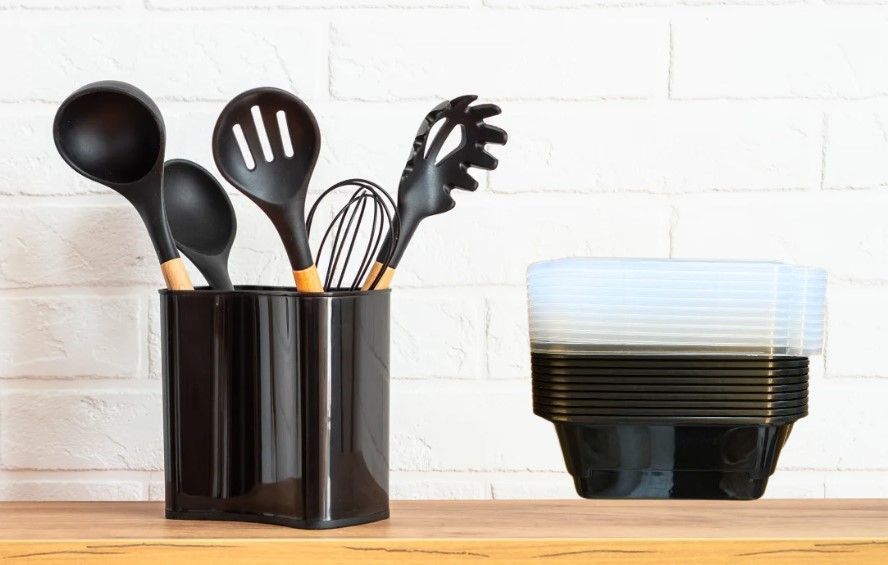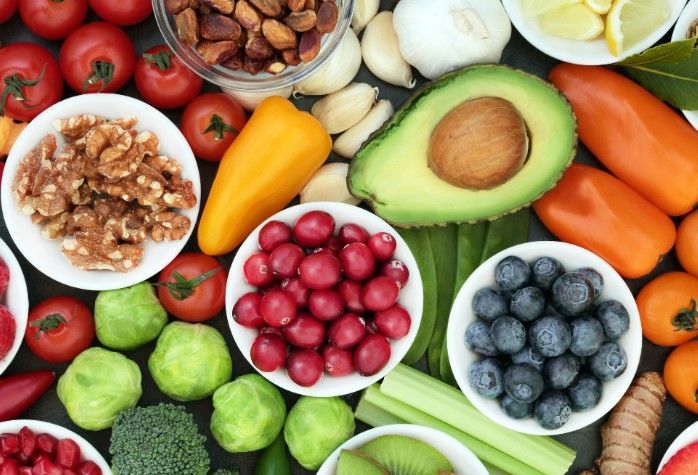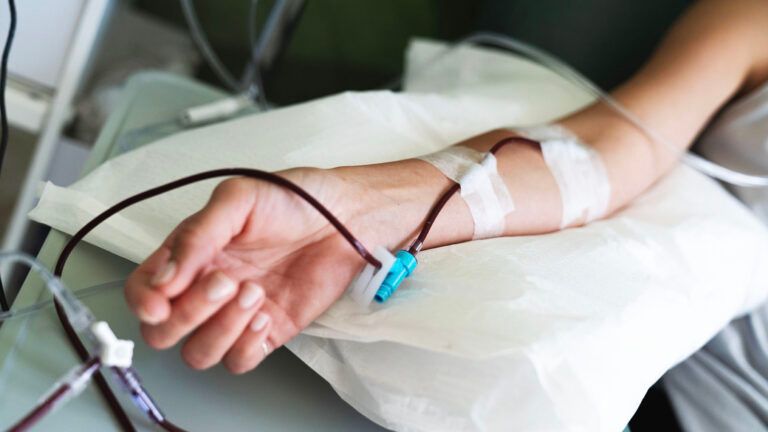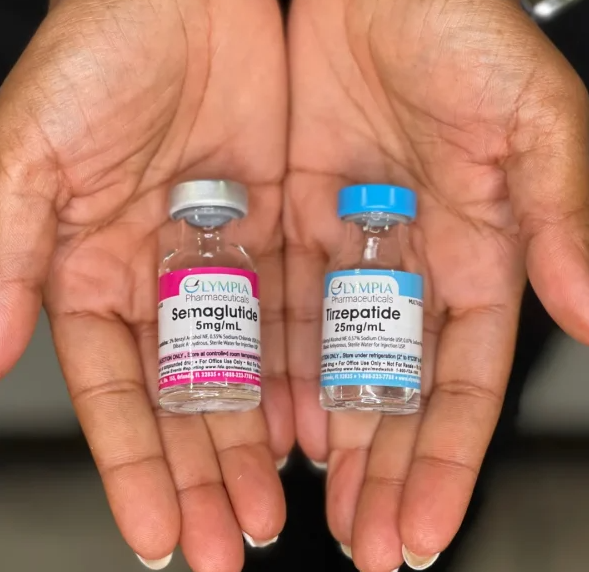Blog Layout
Is Your Black Plastic Spatula Leaking Toxins Into Your Food?
February 8, 2025
Dr. Karen Plymel

The Hidden Dangers of Black Plastic in Your Kitchen
Black plastic kitchenware is a common sight in many homes, found in everything from spatulas and tongs to food storage containers. But while these tools may be convenient, they could also be leaching harmful chemicals
into your food—especially when exposed to heat.
How Black Plastic Puts Your Health at Risk
Many black plastic utensils contain flame retardants
and other toxic chemicals, which can transfer into your food when used at high temperatures. Stirring a hot pot, scraping the bottom of a pan, or leaving a spatula on a hot stove can all increase the risk of exposure. Research has linked these chemicals to thyroid disease, diabetes, cancer, and reproductive, neurological, and immune system damage.
Where Do These Chemicals Come From?
A key concern is that some black plastic kitchenware is made from recycled electronics, which can contain flame retardants and other hazardous substances. A 2018 study found that these chemicals can easily transfer into cooking oil, significantly increasing health risks. More recently, a 2024 study revealed that kitchen utensils contain some of the highest levels of flame retardants among tested consumer products.
But it’s not just cooking utensils. Black plastic is also used in takeout containers, food trays, and even coffee cup lids, all of which can contribute to chemical and microplastic exposure.
Microplastics: An Invisible Threat
Beyond chemical exposure, black plastic can also release microplastics—tiny plastic particles that can enter the body through food and beverages. These microscopic particles have been linked to gut health issues, kidney damage, and other long-term health risks.
Even if black plastic containers aren’t heated directly, hot food and drinks
can still cause chemical and microplastic leaching. Sushi trays, takeout boxes, and plastic lids may all contribute to unintended exposure.
How to Reduce Your Risk
While completely avoiding plastic might not be realistic, here are some simple steps to limit your exposure to harmful chemicals:
✅ Use wood or metal utensils
instead of black plastic for cooking.
✅ Choose glass, stainless steel, or ceramic for food storage.
✅ Cook at home more often to reduce the use of takeout containers.
✅ Drink from a reusable mug instead of using plastic cup lids.
The Need for Safer Solutions
Despite growing concerns, many black plastic products lack clear labeling about their chemical content. Stronger safety regulations and more transparency in plastic recycling are crucial for protecting consumers from unknown risks.
In the meantime, making small changes in your kitchen can help reduce your exposure and protect your health. Have you switched to safer alternatives? Share your thoughts in the comments!

By Karen Plymel, MD
•
January 17, 2025
In the pursuit of a healthier lifestyle, the concept of dietary adherence plays a pivotal role. Many individuals embark on diets with the intention of losing weight or improving their overall health, yet they often encounter challenges that lead to frustration and abandonment of their goals. One of the most significant pitfalls is the tendency to completely cut out favorite foods. However, research suggests that a more flexible approach to dieting can yield better long-term results. The Importance of Dietary Adherence Dietary adherence refers to the extent to which individuals stick to their dietary plans. Studies indicate that the more flexible a diet is, the more likely individuals are to maintain it over time. This flexibility allows for the inclusion of a variety of foods, which can prevent feelings of deprivation. For instance, a study found that participants who included bread in their diets experienced fewer dropouts compared to those who eliminated it entirely. This highlights the importance of allowing for personal preferences within a dietary framework. Flexible Dieting: A Sustainable Approach Flexible dieting is an approach that encourages individuals to enjoy their favorite foods in moderation rather than eliminating them altogether. This method not only fosters a healthier relationship with food but also promotes better adherence to dietary plans. Instead of viewing foods like Oreos, candies, or chocolate as forbidden, individuals can learn to enjoy these treats occasionally while focusing on incorporating more nutritious options into their meals. For example, rather than completely cutting out sweets, one might choose to limit their consumption to special occasions or designate a specific day for indulgence. This strategy can help mitigate cravings and reduce the likelihood of binge eating, which often occurs when people feel deprived. Positive Dietary Changes In addition to allowing for occasional indulgences, making positive dietary changes is crucial for long-term success. This involves focusing on adding healthier foods to one’s diet rather than solely concentrating on what to eliminate. Increasing the intake of vegetables, fruits, whole grains, and lean proteins can significantly enhance overall nutrition. For instance, incorporating a variety of colorful vegetables into meals not only boosts nutrient intake but also adds flavor and visual appeal. Similarly, opting for lean protein sources, such as chicken, fish, or legumes, can help maintain satiety and support muscle health. The Balanced Approach A balanced approach to eating is essential for sustainable dietary adherence. This means including favorite foods in moderation while prioritizing healthier choices. By adopting this mindset, individuals can create a more enjoyable and less restrictive eating plan. For example, someone who loves pizza can enjoy a slice while pairing it with a side salad loaded with vegetables. This not only satisfies cravings but also ensures that the meal is nutritionally balanced. The key is to find harmony between indulgence and health, allowing for enjoyment without compromising overall well-being. The Key to Success In summary, the journey toward healthy eating does not have to be a rigid or punitive experience. The key to a successful diet lies in balance and flexibility. Completely cutting out favorite foods can lead to feelings of deprivation, ultimately resulting in failure to adhere to dietary goals. Instead, focusing on moderation and incorporating healthier options can create a sustainable and enjoyable eating plan. By embracing a flexible approach to dieting, individuals can foster a positive relationship with food, enhance their dietary adherence, and achieve long-term health benefits. Remember, healthy eating is not about perfection; it’s about making informed choices that align with personal preferences and lifestyle. So, indulge occasionally, savor your favorite treats, and prioritize nutritious foods to cultivate a balanced and fulfilling diet.

By Karen Plymel,MD
•
June 17, 2024
Sunscreen is a vital part of any skincare regimen, especially for those concerned with preventing sun damage, photoaging, and skin cancer. With UV radiation being a major contributor to these issues, it's crucial to understand the two primary categories of sunscreen: chemical (organic) and physical (mineral) sunscreens. This article focuses on zinc oxide, a key ingredient in physical sunscreens, and compares its benefits to chemical UV filters and titanium dioxide. The Power of Zinc Oxide Zinc oxide, a mineral-based sunscreen agent, provides broad-spectrum protection against both UVB and UVA rays. Its physical mechanism reflects UV rays, unlike chemical filters that absorb and convert UV radiation into heat. Zinc oxide's non-penetrative nature reduces irritation and the risk of systemic absorption, making it an ideal choice for sensitive skin. Zinc Oxide vs. Chemical Filters While chemical sunscreens use organic compounds to absorb UV radiation, zinc oxide reflects and scatters it, offering superior protection. Zinc oxide also has the advantage of photostability, meaning it remains effective longer compared to some chemical filters that degrade under sun exposure. Furthermore, zinc oxide provides broader protection against UVA rays, including the long-wave UVA that contributes to skin aging and cancer. Why Choose Zinc Oxide? Broad-Spectrum Protection : Blocks both UVA and UVB rays. Stability : Does not break down easily under sun exposure, offering lasting protection. Skin-Friendly : Ideal for all skin types, especially sensitive or acne-prone skin. Eco-Friendly : Zinc oxide is reef-safe, unlike many chemical sunscreens linked to coral bleaching. Final Recommendations Zinc oxide is the best choice for sun protection. Its broad-spectrum efficacy, stability, skin compatibility, and environmental benefits make it superior to chemical filters and titanium dioxide. I strongly recommend incorporating a high-quality, broad-spectrum zinc oxide sunscreen into your daily skincare routine to protect your skin from harmful UV radiation and to ensure healthier skin over time.

February 5, 2024
Explore the differences between conventional medicine, functional medicine, alternative therapies, and naturopathic care to make informed decisions about your healthcare journey. Understand the unique philosophies, practitioners, and treatment modalities to find the best approach for your well-being.
Copyright © 2019 Elevate Health. All Rights Reserved.


